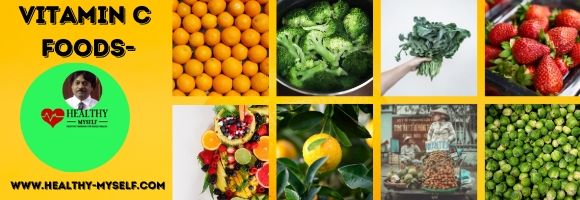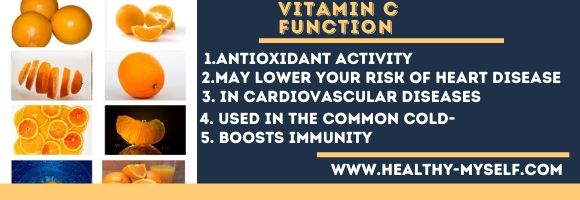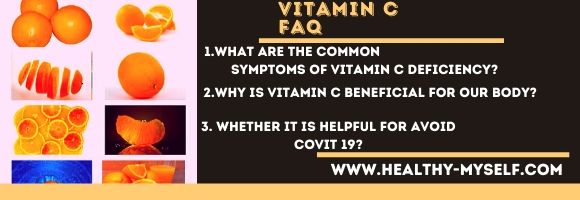Function Of Vitamin C With Food Sources & Deficiency-2021 Update!!
The functions of vitamin c is an interesting topic nowadays.
Are you anxious about Coronavirus? Don’t worry take vitamin C sufficiently and strengthen your immunity power.
And know the power of Vitamin C and also –Function of Vitamin C.
Contents
1.What is Vitamin c-

healthy-myself.com
Vitamin C is a water-soluble compound and found in living organisms.
Vitamin C is an essential vitamin that means your body can’t produce it. Yes, it has many different roles and has been linked to impressive health benefits also.
It is a very essential nutrient for various metabolism in our body and also serves as a reagent for the preparation of many materials in the pharmaceutical and food industry.
Vitamin C also is known as ascorbic acid and is an essential nutrient in many multicellular organisms, especially in humans.
2. Vitamin C Foods-

healthy-myself.com
A. Oranges-
A bite into one cold orange slice is the refreshment you need as the afternoons get hotter.
As much as we like the pulpy slice or its juice.
We will have to know that these fruits make up for a significant Vitamin C intake.
Moreover, one medium-sized orange provides 70mg of the said vitamins.
B. Lemons-
While we have seen many videos of kids reacting to eating lemons and making faces, we can assure you that it is not the best way to consume it.
Lemons, however, contain the highest amount of Vitamin C with 83 mg including its peel.
C. Broccoli-
Moving onto the green, Broccolis is a known vegetable disliked by kids in the west and is kind of a luxury to Asian kids.
It is perhaps one of the best sources of fiber as well as Vitamin K, and Vitamin C.
Half a cup of cooked broccoli contained – 51 mg of Vitamin C-as per research.
D. Kale-
Talking about super healthy foods, kale is the king of greens, and like broccoli, it also is a cruciferous vegetable.
It probably has the highest content of Vitamin A, K, B6, manganese, calcium and not to mention, Vitamin C.
A cup of chopped kale contains 80 mg of Vitamin C while a cup of cooked kale contains 53 mg.
E. Lychee-
Sweet and watery, who knew Lychee would be a good source of Vitamin C.
Many of us as kids have had a lot of lychee juice, but the best way of eating it is to break the fruit and eat the pulp.
Not only are they useful for increasing your blood collagen levels, but one lychee provides 7mg of vitamin C.
F. Brussel Sprouts-
One more cruciferous food on the list, Brussel Sprouts are a popular item to be used in salads. These are high in fiber, Vitamin A, K, and C.
One-half cup of cooked Brussel sprouts provides 49 mg of Vitamin C.
G. Strawberry-
Strawberries are those hearty foods that kids love to know about.
It is used prominently in various desserts as well as looks a gorgeous shade of red. However, the lesser-known fact is the health benefits of strawberries.
One cup of half-cut of these dotted red fruits contains 89 mg of Vitamin C along with a mix of other antioxidants.
3. Daily Intake Of Vitamin c-
For adults, the recommended daily amount for vitamin C is 65 to 90 mg/day.
And the upper limit is 2,000 mg/ day.
4. Vitamin C Function-

healthy-myself.com
Vitamin C plays an important role in many physiological processes in humans. It is needed for the repair of tissues in all parts of the body.
4.1. Antioxidant activity–
One of the important properties of vitamin C is its antioxidant activity.
The antioxidant activity of vitamin C helps to prevent certain diseases such as cancer, cardiovascular diseases, common cold, age-related muscular degeneration, and cataract.
4.2. May lower your risk of heart disease-
Heart disease is one of the leading causes of death in the whole World.
Many factors increase the risk of heart disease, including high blood pressure, high cholesterol levels, and low levels of HDL (good) cholesterol.
4.3. In cardiovascular diseases–
The antioxidant property of vitamin C helps to treat cardiovascular diseases.
Vitamin C has the capability of reducing monocyte adherence to the endothelium and improving endothelium-dependent nitric oxide production.
4.4. Used In the common cold–
The use of vitamin C might reduce the duration of the common cold due to the anti-histamine effect of the high dose of vitamin C.
4.5. Boosts immunity-
Vitamin C boosts your immunity power.
Vitamin C helps these white blood cells function more effectively and protecting them from damage by potentially harmful molecules, like free radicals.
4.6. Protects your memory and thinking as you age-
Dementia is a famous term and is used to describe symptoms of poor thinking and memory.
And also thinking disorders such as dementia, and while a high intake of vitamin C from foods and supplements has been shown to have a protective effect against it.
4.7. Synthesis of protein–
Another vital function of vitamin C is – the synthesis of protein.
Vitamin C helps in the synthesis of collagen.
4.8. Wound healing–
Vitamin C plays a key role in healing wounds by the formation of collagen, connective tissue.
The new tissue is rebuilt with the help of the collagen framework.
This function is supported by its co-factor vitamin C.
Besides this, vitamin C performs as a strong antioxidant and immune system modulator
5. Vitamin C Deficiency-

https://www.healthy-myself.com/function-of-vitamin-c/
the function of vitamin c
- Rough, Bumpy Skin. …
- Corkscrew-Shaped Body Hair. …
- Bright Red Hair Follicles. …
- Spoon-Shaped Fingernails With Red Spots or Lines. …
- Dry, Damaged Skin. …
- Easy Bruising. …
- Slowly Healing Wounds. …
- Painful, Swollen Joints.
9. Weak Bones-
10. Bleeding Gums and Tooth Loss-
11. Poor Immunity-
12. Persistent Iron Deficiency Anemia-
13. Fatigue and Poor Mood-
14. Unexplained Weight Gain-
15. Chronic Inflammation and Oxidative Stress-
6. Conclusion-
Vitamin C is an essential vitamin that means your body can’t produce it.
Yes, it has many fantastic roles and has been linked to impressive health benefits also.
It’s water-soluble vitamins and found in many fruits and vegetables like- oranges, strawberries, kiwi fruit, bell peppers, broccoli, and kale & spinach.
7. FAQ:

healthy-myself.com
A. What are the common symptoms of Vitamin C deficiency?
The preliminary symptoms of Vitamin C deficiency are:
- Tiredness and weakness
- Joint and muscle pains
- Easily getting bruised
- Tiny red-blue spots like bruises on the skin
B. Why is Vitamin C beneficial for our body?
Though Ascorbate is not a cure for the common cold, serious complications of it, maybe avoided by regular inclusion of Vitamin C in the diet.
Other benefits include protection against:
- Deficiency of the Immune System
- Cardio-vascular disease
- Prenatal health problems
- Tooth decay and gum disease
- Eye disease
- Skin wrinkling
C. Whether it is helpful for Avoid Covit 19?
Directly not, But you can strengthen your Immunity power.
You can read here also- https://simple.wikipedia.org/wiki/Vitamin_C
- I’d like to grow my readership.
- Can you help me out by sharing this blog post with your family, friends & colleagues?
- What other ideas can you add to this list that I may have not mentioned, please write to us?
